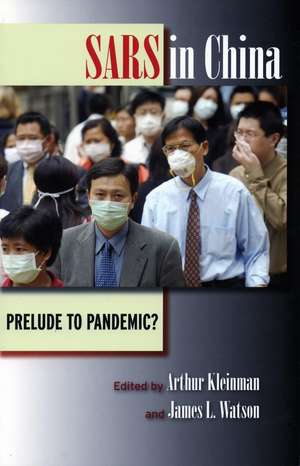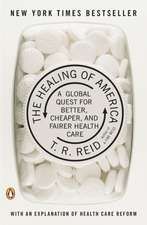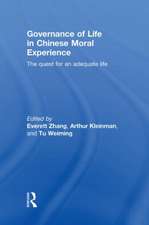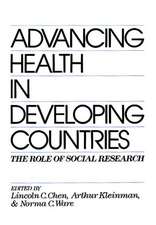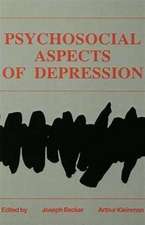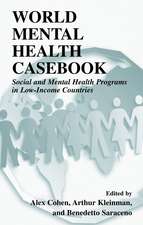SARS in China: Prelude to Pandemic?
Editat de Arthur Kleinman, James Watsonen Limba Engleză Hardback – 30 oct 2005
The SARS epidemic of 2003 was one of the most serious public health crises of our times. The event, which lasted only a few months, is best seen as a warning shot, a wake-up call for public health professionals, security officials, economic planners, and policy makers everywhere. SARS (Severe Acute Respiratory Syndrome) is one of the "new" epidemics. SARS in China addresses the structure and impact of the epidemic and its short and medium range implications for an interconnected, globalized world.
After initially stalling and prevaricating, the Chinese government managed to control SARS before it became a global catastrophe, an accomplishment that required political will and national mobilization. Recent warnings from the World Health Organization (WHO) and the Centers for Disease Control and Prevention (CDC) regarding avian flu make it clear that SARS may have been a prelude to bigger things.
The contributors to this volume include a journalist, WHO's representative in Beijing, and health care professionals, several of whom found themselves on the frontlines of the battle to understand and control SARS. Their vivid, first-hand accounts encouraged other contributors to go beyond the boundaries of their respective disciplines and write for a wide audience.
The authors of this volume focus on specific aspects of the SARS outbreak—epidemiological, political, economic, social, cultural, and moral. They analyze SARS as a form of social suffering and raise questions about the relevance of national sovereignty in the face of such global threats. Taken together, these essays demonstrate that SARS had the potential of becoming a major turning point in human history. This book thus poses a question of the greatest possible significance: Can we learn from SARS before the next pandemic?
Contributors:
Erik Eckholm
Joan Kaufman
Arthur Kleinman
Dominic Lee
Sing Lee
Megan Murray
Thomas G. Rawski
Tony Saich
Alan Schnur
James L. Watson
Hong Zhang
Yun Kwok Wing
After initially stalling and prevaricating, the Chinese government managed to control SARS before it became a global catastrophe, an accomplishment that required political will and national mobilization. Recent warnings from the World Health Organization (WHO) and the Centers for Disease Control and Prevention (CDC) regarding avian flu make it clear that SARS may have been a prelude to bigger things.
The contributors to this volume include a journalist, WHO's representative in Beijing, and health care professionals, several of whom found themselves on the frontlines of the battle to understand and control SARS. Their vivid, first-hand accounts encouraged other contributors to go beyond the boundaries of their respective disciplines and write for a wide audience.
The authors of this volume focus on specific aspects of the SARS outbreak—epidemiological, political, economic, social, cultural, and moral. They analyze SARS as a form of social suffering and raise questions about the relevance of national sovereignty in the face of such global threats. Taken together, these essays demonstrate that SARS had the potential of becoming a major turning point in human history. This book thus poses a question of the greatest possible significance: Can we learn from SARS before the next pandemic?
Contributors:
Erik Eckholm
Joan Kaufman
Arthur Kleinman
Dominic Lee
Sing Lee
Megan Murray
Thomas G. Rawski
Tony Saich
Alan Schnur
James L. Watson
Hong Zhang
Yun Kwok Wing
| Toate formatele și edițiile | Preț | Express |
|---|---|---|
| Paperback (1) | 125.19 lei 3-5 săpt. | |
| Stanford University Press – 26 oct 2005 | 125.19 lei 3-5 săpt. | |
| Hardback (1) | 686.65 lei 6-8 săpt. | |
| Stanford University Press – 30 oct 2005 | 686.65 lei 6-8 săpt. |
Preț: 686.65 lei
Preț vechi: 722.79 lei
-5% Nou
Puncte Express: 1030
Preț estimativ în valută:
131.39€ • 137.53$ • 109.36£
131.39€ • 137.53$ • 109.36£
Carte tipărită la comandă
Livrare economică 31 martie-14 aprilie
Preluare comenzi: 021 569.72.76
Specificații
ISBN-13: 9780804753135
ISBN-10: 080475313X
Pagini: 256
Dimensiuni: 140 x 216 x 20 mm
Greutate: 0.39 kg
Ediția:1
Editura: Stanford University Press
Colecția Stanford University Press
ISBN-10: 080475313X
Pagini: 256
Dimensiuni: 140 x 216 x 20 mm
Greutate: 0.39 kg
Ediția:1
Editura: Stanford University Press
Colecția Stanford University Press
Recenzii
"SARS in China not only makes a significant contribution to China studies but also provides important clues about the state of preparation for global health challenges such as avian flu."—China Review International
"This book has lined up a remarkable team of authors to try to answer the question: what can we learn from SARS before the next pandemic? And its value lies in the significant issues that it has highlighted."—The China Review
Notă biografică
Arthur Kleinman is Esther and Sidney Rabb Professor and Chair of the Department of Anthropology, Harvard University, and Professor of Medical Anthropology and Social Medicine at the Harvard Medical School. James L. Watson is Fairbank Professor of Chinese Society and Professor of Anthropology at Harvard University. He is also the author of Golden Arches East: McDonald's in East Asia (Stanford University Press, 1997).
Textul de pe ultima copertă
"This book has lined up a remarkable team of authors to try to answer the question: what can we learn from SARS before the next pandemic? And its value lies in the significant issues that it has highlighted."—The China Review
Descriere
This book examines the structure and impact of the SARS epidemic, and its short- and medium-range implications for an interconnected, globalized world. In so doing, it poses a question of the greatest possible significance: Can we learn from SARS before the next pandemic?
